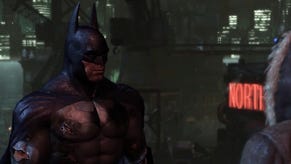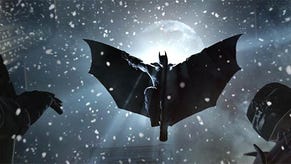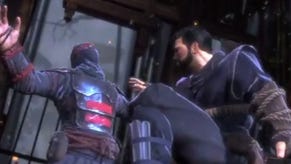Wot I Think: Batman – Arkham Origins
A Knight To Remember?
Despite its name, Arkham Origins isn’t so much Batman Begins as Batman Continues. A cynic might presume that the handing of the license to a new studio and rapid turn-around of the sequel suggests that Batman is mainly continuing because Pennyworth needs a new pair of shoes. But has the vigilante become a mercenary or is this another solid entry in the series? Here’s wot I think.
Rocksteady created a franchise within a franchise across their two Arkham games. The simple, tightly focused storyline that saw Batman trapped inside with all the other lunatics for a night used the DC license well, cramming secrets and references in the darkest corners of the titular facility. Popping the Arkham name in front of City, displacing Gotham in the process, just about worked in the context of the madly overblown Super Prison storyline of the second game, but Arkham Origins isn’t about the beginnings of the Asylum. It’s about the beginnings of the franchise, a prequel that returns to the well and finds it rather dry, but dips in and brings up a bucket of mud anyhow.
Batman still biffs thugs in the free-flow combat style that is as much rhythm action as beat ‘em up. He still stalks terrified mobsters and henchmen, dangling them from lampposts and gargoyles. There are gadgets to collect and upgrade, side missions to distract from the urgent business of assassination, and boss battles against villains, some of which are super, most of which are ordinary.
Origins plays out across the same beats that worked to good effect in its predecessors but Warner Bros Montreal hammer their instruments like a hastily assembled cover band. As a Batman game, Origins lacks the claustrophobia and fear of Asylum, and the hyper-exaggerated heroic spectacle of City, and as an Arkham game it’s a little like a collection of undesirable B-sides (not Sci-Fi Lullabies, the greatest B-side album).
The plot has some promise. Bruce Wayne is at the early stages of his career as a crime fighter, although he’s been operating for a couple of years rather than a couple of weeks, and many of Gotham’s great and grotesque still think The Bat is nothing more than a myth. They’re frightened of it – and many of them do think of Batman as monster rather than man – even if they’re not sure that it’s real. Makes sense. They are a cowardly and superstitious lot, after all.
Black Mask believes in the Bat though. As Gotham’s mobster king, he wants rid of the vigilante and decides to invite the world’s most accomplished assassins to Gotham, offering a humongous cash prize to the one who eliminates Batman. A vulnerable, beleaguered Wayne, hunted in his own city, could have been interesting, shifting the flow of the game from the increasingly typical Ubi-style experience of running from activity to activity on a cluttered map.
As in Arkham City, Batman has the freedom of Gotham but it’s still an empty place, the streets harbouring an occasional pocket of perps but devoid of ordinary civilians. The previous game explained its empty streets by altering the structure and purpose of Gotham. Origins’ reasoning is far more flimsy and unconvincing. It’s Christmas Eve and there’s a heavy snowstorm so people have been instructed to stay indoors. There are no last minute Christmas shoppers nipping to Argos to buy a novelty pepper mill, no crowds of carollers or carousers. If it weren’t for the gangs of thugs, Gotham would be quiet as a mouse.
It feels like a ghost town, with nobody to protect and nobody to serve. That would be fine if Batman felt like a target but he continues to be the instigator, spending the first couple of hours collecting SIM cards from criminals in order to trace signals back to Penguin’s location. It’s important to find Penguin because he knows where Black Mask is and because he’s one of the few members of the rogue’s gallery included here that a casual fan might recognise.
I actually read Batman comics, even now, after the whimpering New 52 launch. In fact, the Court of Owls storyline that kicked off the relaunched Batman provided a decent template for a storyline that wasn’t reliant on recognisable villains and had Batman reeling and defeated, at war with the essence of Gotham rather than a man in a costume. The villains in Origins are weak, particularly the assassins themselves, and it’s telling that some of the game’s strongest moments arrive when it leans back on the safety of everybody’s favourite clown.
It’s not that the likes of Deadshot, Deathstroke and Copperhead are inherently dull, but they’re given short shrift, barely established before they are reduced to boss fight purgatory. At their least inspiring, the villain confrontations tweak the free-flow combat system slightly, as with Bane. His encounters aren’t new, being variations on those in Arkham Asylum, and they add little more to the flurry of punches and counters than an extra-large lump to evade until the time is right to chip away at its health bar.
The brawling itself, more dance than devastation, is almost as effective as it was in the previous two games. It suffers from repetition. There are various types of basic thug – armoured, knife-wielding etc. – but there are hundreds of them between Batman and whatever objective he’s chasing at any given time. Even the physicality of the fights feels undersold in comparison to the chunky impact of Arkhams past. The environments don’t help – despite the open world hub, many missions feel more corridor-bound than the Asylum did.
Predator sections, wherein the player uses a combination of stealth and gadgetry to take down a group of enemies, are the other punctuation mark in the rambling winter’s tale. Little has been added and, again, something has been lost. Partly, every problem can be traced back to the fact that what was fresh in Arkham Asylum has become formulaic, The sprawl and silliness of the second game strained the core of the game, adding spectacle and scale at the cost of focus, but Rocksteady’s craft and muscular polish carried the weight of the game’s immense absurdities. Origins is drab in comparison.
Improved crime scene investigations are one of the few additions that Warner Montreal have added to the formula, permitting the player to rewind a holographic re-enactment of events to discover evidence. It’s an enjoyable diversion but there aren’t nearly enough scenes to allow for more than a basic exploration of the idea. Until the last couple of scenes, investigations feel like a tutorial for a part of the game that never really arrives.
I’ve read about enough bugs to give an entomologist a wet dream and I’ve encountered a couple myself. Most irritating was a door that refused to open, leaving me to explore every corner of a large room in search of another way out. Turns out I just had to reload my autosave to unjam the door, which occasionally becomes inexplicably broken. There are glitches – enemies freezing in place, animations twitching – and noticing how much they annoyed me brought me to a realisation.
The Arkham games have been among the few honest-to-goodness blockbuster releases that I’ve thoroughly enjoyed in recent times. Rocksteady backed up solid design with strong tech, and a high degree of polish. Take away the latter and even with the license still in place and the basics of the mechanics carried across, Origins is lacking. It feels uninspired, like filler between main courses, and highlights how important the shininess of previous Arkham games was. That’s not an insult, it’s a recognition of the kind of games they are. Big, daft and brash.
Origins isn’t big, daft or brash enough. It makes the missteps of Arkham City seem less clumsy and makes me hope that Rocksteady really are working on a sequel of their own or the rumoured Silver Age Batman game. They have used the license well, to tell preposterous but entertaining stories, and they are the definite masters of the mechanics they created. Origins is confused and hollow in comparison, taking place in a city full of enemies and encounters, but lacking purpose. In this incarnation, Gotham doesn’t deserve to be saved.
The side missions don't help matters, feeling like distractions and, on the whole, offering less variety and challenge than in the previous games. One Riddler objective was behind a locked door but a nearby building provided access via a balcony. I could grapple to any other rooftop or ledge in the area but that one was locked off, even though it looked identical. I had to go through the door. There's a lack of logic, and Batman's freedom and toolset don't always work as they should.
If you need more Batman and another Arkham game, Origins just about fits the bill. The dish is recognisable but it’s fast food rather than gourmet. Add a sprinkle of glitches and upcoming DLC that will continue the story, which feels incomplete, and you’re left with the sort of meal that leaves a bad taste in the mouth.
Batman: Arkham Origins is available now. I've barely touched the multiplayer, developed by Splash Damage, but it pits two sets of crooks against each other, with Batman and Robin as a third team in the middle. It might well be the best part of the game, although it's probably best to judge it when player numbers remain steady/dwindle.













